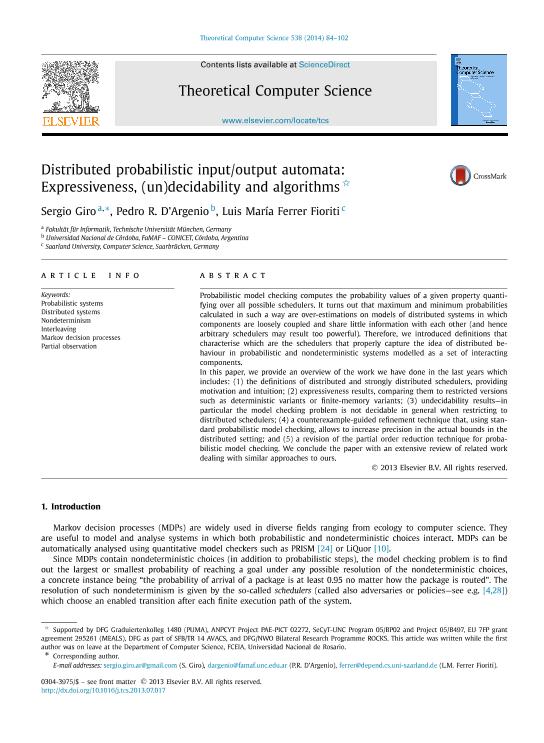Mostrar el registro sencillo del ítem
dc.contributor.author
Giro, Sergio Sebastian

dc.contributor.author
D'argenio, Pedro Ruben

dc.contributor.author
Ferrer Fioriti, Luis Maria
dc.date.available
2018-01-22T14:53:25Z
dc.date.issued
2014-06
dc.identifier.citation
Giro, Sergio Sebastian; D'argenio, Pedro Ruben; Ferrer Fioriti, Luis Maria; Distributed probabilistic input/output automata: Expressiveness, (un)decidability and algorithms; Elsevier Science; Theoretical Computer Science; 538; 6-2014; 84-102
dc.identifier.issn
0304-3975
dc.identifier.uri
http://hdl.handle.net/11336/34067
dc.description.abstract
Probabilistic model checking computes the probability values of a given property quantifying over all possible schedulers. It turns out that maximum and minimum probabilities calculated in such a way are over-estimations on models of distributed systems in which components are loosely coupled and share little information with each other (and hence arbitrary schedulers may result too powerful). Therefore, we introduced definitions that characterise which are the schedulers that properly capture the idea of distributed behaviour in probabilistic and nondeterministic systems modelled as a set of interacting components. In this paper, we provide an overview of the work we have done in the last years which includes: (1) the definitions of distributed and strongly distributed schedulers, providing motivation and intuition; (2) expressiveness results, comparing them to restricted versions such as deterministic variants or finite-memory variants; (3) undecidability results—in particular the model checking problem is not decidable in general when restricting to distributed schedulers; (4) a counterexample-guided refinement technique that, using standard probabilistic model checking, allows to increase precision in the actual bounds in the distributed setting; and (5) a revision of the partial order reduction technique for probabilistic model checking. We conclude the paper with an extensive review of related work dealing with similar approaches to ours.
dc.format
application/pdf
dc.language.iso
eng
dc.publisher
Elsevier Science

dc.rights
info:eu-repo/semantics/openAccess
dc.rights.uri
https://creativecommons.org/licenses/by-nc-sa/2.5/ar/
dc.subject
Probabilisstic Systems
dc.subject
Distributed Systems
dc.subject
Nondeterminism
dc.subject
Interleaving
dc.subject
Markov Decision Processes
dc.subject
Partial Observation
dc.subject.classification
Ciencias de la Computación

dc.subject.classification
Ciencias de la Computación e Información

dc.subject.classification
CIENCIAS NATURALES Y EXACTAS

dc.title
Distributed probabilistic input/output automata: Expressiveness, (un)decidability and algorithms
dc.type
info:eu-repo/semantics/article
dc.type
info:ar-repo/semantics/artículo
dc.type
info:eu-repo/semantics/publishedVersion
dc.date.updated
2018-01-22T14:16:15Z
dc.journal.volume
538
dc.journal.pagination
84-102
dc.journal.pais
Países Bajos

dc.journal.ciudad
Amsterdam
dc.description.fil
Fil: Giro, Sergio Sebastian. Technische Universität München; Alemania
dc.description.fil
Fil: D'argenio, Pedro Ruben. Universidad Nacional de Córdoba. Facultad de Matemática, Astronomía y Física; Argentina. Consejo Nacional de Investigaciones Científicas y Técnicas; Argentina
dc.description.fil
Fil: Ferrer Fioriti, Luis Maria. Saarland University; Alemania
dc.journal.title
Theoretical Computer Science

dc.relation.alternativeid
info:eu-repo/semantics/altIdentifier/url/http://www.sciencedirect.com/science/article/pii/S0304397513005203
dc.relation.alternativeid
info:eu-repo/semantics/altIdentifier/doi/http://dx.doi.org/10.1016/j.tcs.2013.07.017
Archivos asociados
